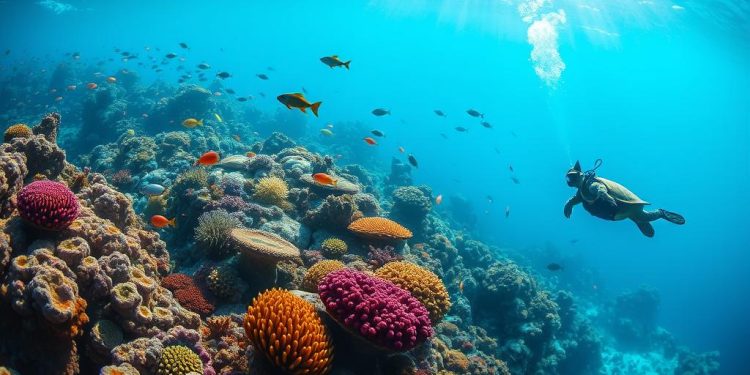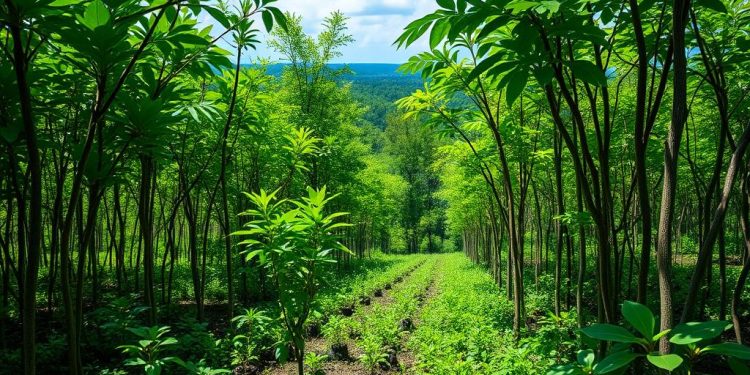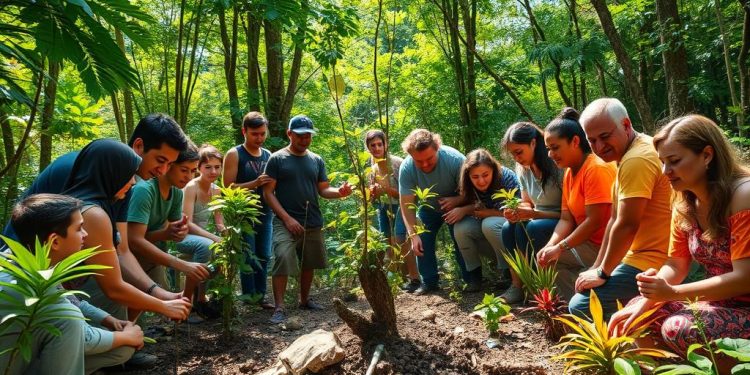As we look ahead to 2025, the urgency of supporting Global Conservation Projects is more critical than ever. These vital initiatives aim to safeguard our planet’s rich biodiversity, precious ecosystems, and valuable natural resources. Effective environmental sustainability strategies are essential in combating climate change, preserving wildlife, and ensuring future generations live in a thriving environment.
Since its inception, the Global Conservation Fund (GCF) has supported the protection of over 81 million hectares across the globe, generating significant impacts, including more than $200 million for conservation initiatives and creating or expanding 135 protected areas in 26 countries. These efforts have not only created jobs—benefiting over 60,000 individuals—but also have helped secure habitats for more than 500 globally threatened species.
By engaging with these eco-projects and participating in conservation volunteering, you can contribute to meaningful change while gaining hands-on experiences in diverse ecosystems. Your involvement can lead to substantial positive effects, fostering a healthier planet for all.
Understanding the Importance of Global Conservation Efforts
Global conservation plays a critical role in protecting our environment and ensuring the survival of diverse wildlife. This collective effort aims to counter the adverse effects of human actions like deforestation and pollution. By understanding the importance of conservation, we can contribute to vital biodiversity protection initiatives, advocate for ecosystem restoration, and promote sustainable practices within our communities.
What is Global Conservation?
Global conservation refers to strategic initiatives focused on preserving natural habitats and ensuring the thriving of threatened species. Through organizations like Global Wildlife Conservation (GWC), over the past decade, efforts have spanned more than 50 countries, fostering the establishment of over 30 protected areas that serve as sanctuaries for endangered species. These initiatives emphasize that effective conservation can significantly enhance biodiversity protection and positively impact thousands of species worldwide.
The Role of Conservation in Biodiversity Protection
Conservation actions are essential for biodiversity protection, especially considering the alarming number of species at risk of extinction. Studies have shown that targeted conservation efforts improved the state of biodiversity in 66% of cases. The recovery and protection of unique species, notably in critical habitats, reflect the potential of conservation when local communities actively participate. Donations to conservation projects directly support field initiatives, ensuring that resources are allocated efficiently to address the most pressing environmental issues.
| Conservation Efforts | Impact on Biodiversity | Key Statistics |
|---|---|---|
| Protected Areas Established | Habitats for 150+ endangered species | 30+ areas across 50+ countries |
| Species Supported | Positive effects on 20,000+ species | Data from GWC findings |
| Funding Efficiency | 100% donation allocation to field initiatives | No operational costs from donor funds |
| Biodiversity Improvement | 66% success rate in improving species populations | Study findings on conservation actions |
Key Global Conservation Projects to Support in 2025
Conservation efforts across the globe play a pivotal role in sustaining ecosystems and safeguarding biodiversity. Various projects focus on marine conservation and wildlife preservation, addressing urgent environmental issues. Investing your resources into these initiatives can create a lasting impact on our planet’s health.
Marine Conservation Initiatives
Marine conservation initiatives protect oceans and coastal ecosystems, crucial for maintaining biodiversity and human livelihoods. Projects often focus on the following:
- Restoring coral reefs through active rehabilitation techniques.
- Implementing sustainable fishing practices to manage fish populations.
- Addressing pollution affecting marine environments.
These efforts are vital, considering oceans not only regulate the climate but also support millions of people worldwide. For example, Project AWARE has successfully removed 966,546 bits of debris from the oceans across 182 countries, showcasing the impact of community conservation in keeping marine habitats clean.
Forest and Wildlife Conservation Efforts
Equally essential are forest and wildlife conservation endeavors. These projects aim to protect vital habitats and the species that rely on them. Key aspects include:
- Habitat restoration initiatives, such as China’s goal to increase forest coverage from 21.7% to 26% by 2030.
- Establishing national parks, with Chile adding five new parks to total 17 covering 10 million acres.
- Monitoring endangered species, illustrated by the impressive growth of the southern white rhino population in Africa from about 50 in the late 1800s to around 11,000 today.
By supporting these conservation projects, you actively contribute to preserving unique biodiversity and fostering sustainable community practices. Projects in regions like Madagascar and the Amazon demonstrate commitment to restoring habitats and protecting wildlife, blending both ecological welfare and community needs effectively.
Global Conservation Projects to Support in 2025
Participating in eco and sustainable agriculture projects provides a meaningful way to contribute to environmental preservation. These initiatives focus on reducing the ecological footprint of traditional farming methods, fostering practices that align with sustainable farming principles. By embracing organic farming, local farmers gain the tools they need to produce food responsibly, enhancing both soil and water quality. This approach enables communities to thrive while actively participating in preserving ecosystems.
Eco and Sustainable Agriculture Projects
Engagement in eco-agriculture is vital for promoting better agricultural practices, enhancing food security, and reducing adverse environmental impacts. Several notable projects exemplify this approach:
- Cost Rica Eco Agriculture: Volunteers contribute to the coffee industry, aiding in everything from harvesting beans to packaging. This initiative highlights how eco-agriculture supports livelihoods while prioritizing environmental health.
- Sustainable Farming in Romania: Emphasis on organic farming practices has gained momentum, presenting a sustainable method of food production that minimizes carbon footprints.
- Forest Conservation in Madagascar: Volunteers aid in monitoring the health of various species, contributing significantly to ecosystem preservation.
Community Conservation Programs
Community conservation programs serve as a backbone for local populations, involving them directly in preservation activities that protect their natural surroundings. These efforts ensure everyone benefits from sustainable practices:
- Environmental Education in Bali: This program promotes sustainable living within local communities, aiming to restore biodiversity.
- Initiatives in New Orleans: Programs target population engagement in sustainability practices to foster a resilient community.
- Reforestation Projects in Portugal: Volunteers work on controlling invasive species and maintaining walking trails, allowing ecosystems to recover over time.
Getting involved in these community conservation programs enables you to participate actively in environmental stewardship. Through hands-on efforts, such as volunteering with conservation organizations, you help promote biodiversity and community resilience, essential aspects of sustainable living.
| Project Type | Location | Description | Volunteer Activities |
|---|---|---|---|
| Eco Agriculture | Costa Rica | Supports the coffee industry with sustainable practices. | Harvesting, packaging, and eco-friendly farming techniques. |
| Sustainable Farming | Romania | Focuses on organic farming to minimize ecological impacts. | Hands-on farming practices emphasizing sustainability. |
| Community Conservation | Madagascar | Involves local communities in forest data collection for habitat health. | Monitoring wildlife and restoring habitats. |
| Environmental Education | Bali | Promotes sustainable living and biodiversity restoration. | Community workshops and outreach programs. |
How You Can Get Involved in Environmental Activism
Getting involved in environmental activism proves to be both fulfilling and impactful. Numerous volunteer opportunities are available worldwide, allowing you to contribute to conservation projects that align with your interests and skills. Whether you want to engage in wildlife rehabilitation, participate in marine restoration, or support community gardens, each effort counts towards a healthier planet.
Volunteering Opportunities Across the Globe
Numerous organizations provide platforms for you to immerse yourself in hands-on conservation work. For instance, International Bird Rescue and Wild Bird Fund focus on rehabilitating injured wildlife but rely on volunteers for stability and care. Engaging in local cleanups constitutes another way to reduce hazards for wildlife while minimizing groundwater pollution.
Community gardens not only support local food systems but also enhance urban biodiversity. As a volunteer, you can assist in creating green spaces that benefit pollinators and absorb carbon. During events like National Trails Day, celebrated on the first Saturday in June, you can participate in trail clean-up and maintenance activities that foster appreciation for natural areas.
Engaging with Environmental NGOs
Connecting with environmental NGOs offers a unique opportunity to raise awareness about critical issues, such as climate change and deforestation. Organizations like the Rainforest Alliance equip youth with the knowledge to become future environmental stewards. Many nonprofits benefit from the diverse skill sets volunteers offer, ranging from legal support to design and writing assistance.
The Arbor Day Foundation facilitates tree planting, contributing to ecosystem enhancements. DoSomething.org mobilizes millions of young volunteers who focus on essential environmental and social issues. Initiatives like the Plastic Pirates empower individuals to document and analyze waste, advancing environmental research efforts.
| Volunteer Opportunity | Description | Organization |
|---|---|---|
| Wildlife Rehabilitation | Assist injured wildlife and learn care techniques. | International Bird Rescue |
| Community Gardening | Create green spaces that improve urban biodiversity. | Local community initiatives |
| Trail Clean-Up | Participate in maintaining natural trails. | National Trails Day |
| Waste Documentation | Analyze waste locations and quantities for better strategies. | Plastic Pirates |
| Tree Planting | Support ecosystem benefits through tree planting. | Arbor Day Foundation |
Your involvement makes a difference, whether you’re picking up trash along a river or participating in educational programs. Contributing to environmental NGOs fosters a community of passionate individuals working towards a sustainable future.
Success Stories from Global Conservation Efforts
Global conservation efforts have brought about inspiring success stories that exemplify the impact of dedicated initiatives. These cases highlight not only the importance of conservation but also the significant benefits achieved through focused strategies. Let’s explore two key examples: rainforest conservation in Madagascar and the sustainable agriculture impact in Costa Rica.
Case Study: Rainforest Conservation in Madagascar
In Madagascar, rainforest conservation initiatives have made remarkable progress. These efforts involve monitoring endangered species, promoting reforestation activities, and protecting crucial habitats. As a result, the ecological balance in the region has begun to stabilize, contributing to the preservation of Madagascar’s unique biodiversity. This conservation success story emphasizes how targeted actions can create a positive ripple effect for wildlife and local communities.
Impact of Sustainable Agriculture in Costa Rica
Sustainable agriculture practices in Costa Rica have significantly enhanced local food systems while safeguarding biodiversity. Programs that focus on organic farming and sustainable land management techniques have led to improved crop yields and minimized environmental harm. These initiatives not only promote biodiversity but also showcase the sustainable agriculture impact that benefits both farmers and consumers. These success stories underscore the vital role of conservation efforts in creating a sustainable future for our planet.
| Conservation Area | Key Achievements | Impact on Biodiversity |
|---|---|---|
| Madagascar Rainforests | Monitoring endangered species, reforestation | Restored ecological balance, protected unique wildlife |
| Costa Rica Agriculture | Organic farming initiatives, sustainable land management | Improved crop yields, preservation of local biodiversity |
Conclusion
As we approach 2025, the necessity to support global conservation initiatives becomes increasingly evident. Engaging in these projects offers you the opportunity to actively join conservation efforts and contribute to the protection of the environment. Research has shown that involving indigenous and local communities often leads to better outcomes than traditional state or international models. Communities that become stewards of their natural resources are more effective at safeguarding ecosystems and species.
Your involvement can take many forms, from volunteering with organizations such as WWF or the Wildlife Conservation Society, to directly supporting local conservation programs. Data highlights that effective strategies, such as community-led protections, have resulted in a drastic reduction in poaching rates, exemplified by the near eradication of threats to giant Amazon river turtles when local populations took charge. This illustrates how you can make a difference by fostering collective responsibility and stewardship.
Ultimately, with approximately 1 million species on the brink of extinction, it is imperative to act decisively. Through informed actions, you can play a vital role in reshaping the future of our planet. Supporting initiatives aimed at expanding protected areas and community engagement will ensure your efforts contribute to long-term positive change. Together, we can advance the mission to protect what remains of our diverse ecosystems and secure a sustainable future for generations to come.






